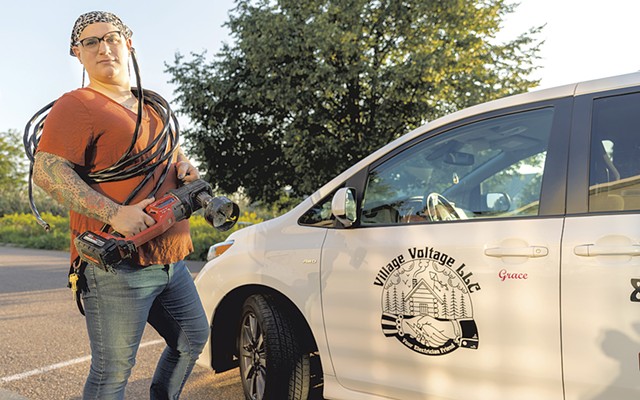click to enlarge 
- James Buck
- Grace Kahn of Village Voltage
The last few years have been big for Grace Kahn. Last summer she posted an ad on Front Porch Forum for her freelance services as an electrician; now she's the owner of Village Voltage, a Williston-based company that employs a master electrician and an apprentice. She came out as a trans woman in 2018, and she says that embracing her true identity motivated her to start the business.
"There was this newfound drive because I was officially me," Kahn said.
Kahn moved to Williston from South Florida in 2014 with her now ex-wife and children after googling "best places to raise kids." In Florida, she'd owned a swimming pool maintenance business, a career she knew wouldn't transfer well to Vermont.
She ended up training as an electrician at a large company, which she declined to name because things went south after Kahn came out. Kahn said her boss didn't understand her transition. He eventually stopped calling her during the pandemic, which Kahn saw as a convenient excuse to push her out.
Inspired by a mantra from Glennon Doyle's book Untamed — "We can do hard things" — and knowing there was a shortage of electricians in Vermont, Kahn posted her advertisement in May 2020.
"Boom. It was off to the races," she said.
Her offerings at the time were small-scale. "I was rolling up in a 2012 Subaru sedan with a couple of car seats in the back," she said.
People liked her work and recommended her, and business grew. Within a few months, she was able to get licensed (which is not required for some residential electrical repairs), buy a van and hire a former coworker. Now her team is working on new houses and bidding on larger projects, and Kahn wants to provide jobs and training opportunities for other people with marginalized identities.
Seven Days spoke with Kahn by phone for an illuminating conversation about her work and goals.
SEVEN DAYS: Why do you think representation and diversity are important in your line of work, and in the trades in general?
GRACE KAHN: I could give you 50 reasons. In electrical, because there are no electricians. You need to start shopping in other places if there are no guys out here, you know? If they're out of Heinz ketchup, you're going to have to go get Hunt's.
But also, for me as a trans person — can we change opinions, social constructs, cultural norms so that people like me can exist more comfortably in the world? Trans women are really struggling to get jobs. That's huge. I'm not a billionaire with a million different companies that I can staff with LGBTQ+ folks. But I take care of my employees.
At the end of the day, I'm not only out there so that cis people can see me. I went to Jericho, Vt., to a pride thing I took my kids to, and I met this trans guy, 12 years old, named Charlie. And Charlie's like, "Are you trans?" I was like, "Yeah, I'm a trans woman. I own this business. I'm an electrician." He was like, "What?" I was like, "Dude, you're totally normal."
I didn't come out until I was 33, and it was really hard. The fact that I'm out here doing this is going to help get the kids out of the closet at 12 and not 33. I want to save people from pain if I can, because there've been wonderful trans activists out there that have done this for me.
We're business owners, and we're charitable, and we're part of this community. We're not hiding in the shadows.
SD: What do you think are the barriers that still exist to diversifying the trades?
GK: The comfortable way that men will say horrific things to each other. This girl that I hired today, she worked one day for one large company here in Vermont, and she said the word "faggot" was used multiple times. I don't know if there's a simple answer to changing toxic masculine culture on job sites. It's so normalized. I would correct it.
SD: Does it get frustrating or tiring to have to correct and teach people?
GK: Yeah, it gets tiring. But you hear how I am: I try not to judge people. Everybody has a heart, and I know how to get into that heart. So that's what I lead with.
But as hard as it is for me, it's harder for people who don't have the words that I have and the courage that I have, which I've only really found in the last couple years with really heavy-duty therapy.
I love to see the look on people's faces when I make them laugh, and I know they're leaving with a sense of, I just met a trans person who's cool as hell, and she loves herself. It just feels really good when I can see them flip.
SD: Do you think, overall, Vermont is supportive of LGBTQ business owners?
GK: Yes. It's not my typical customer ... who's confused by me and us. I show my humanity to people. And I find the humanity in them.
SD: Are there opportunities in your work when you have to problem solve or think creatively?
GK: Constantly. There are these wireless [light] switches that I've been using. You can wire the one switch into where your regular switch is, and then there's a wireless component, [which connects to the wired switch,] that you strap to the wall with a bracket, and you put a plate over it so it looks like it's an actual switch, and it works flawlessly. The technology is there at this point, and you can trust it. People are like, "I only have one switch at the top of the stairs, and every time my kids come downstairs, they don't shut the lights off." [With the wireless switches,] I don't have to run wire in the walls. That's really cool.
Smoke detectors drive people crazy. If they are doing funky things and your batteries are all fresh and you're not seeing any weird lights blinking, you can blow compressed air in them and essentially just blow all the gunk and the dust out. It can save people a tremendous amount of money, because smoke detectors are not cheap, and fire doesn't discriminate. You can give this secret away.
SD: What should potential customers expect about your availability right now?
GK: Somebody called me today, and I told them, "Maybe in a month, if I get help." We are popular, and I think it's just because we have a great reputation now.
I started this business with the dream of only having an apprentice and hiring a trans person or a queer person. I just wanted to pay the bills and pay my child support and have a place for myself to transition safely and comfortably. That was the idea that started this, and I did not imagine that I would be here now.
This interview has been edited and condensed for clarity and length.



















































